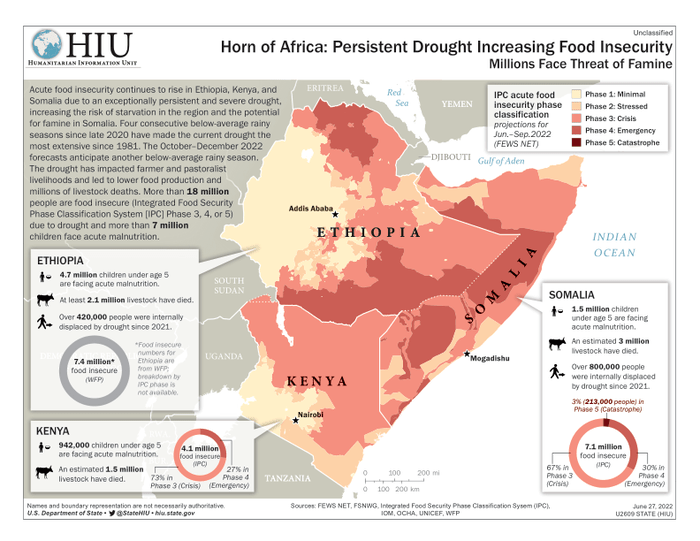East Africa Food Insecurity and the Role of AFRICOM
As the White House continues its imperialist militarism in the Horn of Africa and its environs, the war in Ukraine and draconian sanctions against Moscow are hampering the social stability on the continent.

All Global Research articles can be read in 51 languages by activating the Translate Website button below the author’s name.
To receive Global Research’s Daily Newsletter (selected articles), click here.
Click the share button above to email/forward this article to your friends and colleagues. Follow us on Instagram and Twitter and subscribe to our Telegram Channel. Feel free to repost and share widely Global Research articles.
***
On July 19, several media sources reported that airstrikes were carried out against what was claimed to be the bases of the Islamist group fighting the central government in the Horn of Africa state of Somalia.
The attacks were coordinated and implemented by the United States Africa Command (AFRICOM) with the assistance of the western trained forces of the Somalian National Army (SNA).
In a report published by the Voice of America (VOA), it notes that:
“AFRICOM said the strike was in support of Somali National Army forces fighting al-Shabab. The strike came at the request of the federal government of Somalia, the statement added. AFRICOM said it will continue to assess the results of Wednesday’s (July 19) operation and will provide additional information ‘as appropriate.’ The Somali government has been fighting al-Shabab militants since 2006. The group was removed from major cities but continues to control vast areas in the countryside. In August 2022, the Somali army, supported by self-mobilized local fighters, launched a military offensive that seized parts of central Somalia from the militant group. The militants have struck back, raiding military bases and inflicting heavy losses on government forces in the south and central regions.”
Apparently in response to the bombing of the previous week, on July 24, a military training facility of the SNA was attacked by a suicide bomber resulting significant casualties and physical damage. This continuing conflict in Somalia can be traced back to the persistent interference in the internal affairs of the country by successive administrations in Washington and their allies.
President Joe Biden, a Democrat, redeployed hundreds of Pentagon troops from AFRICOM to Somalia during the early phase of his tenure in office. This policy decision was carried out after his predecessor, President Donald Trump, had withdrawn soldiers from Somalia prior to his leaving office in early 2021.
AFRICOM has been operating on the continent for the last 15 years while the level of instability has increased in several geopolitical regions. In West Africa, states such as Mali, Burkina Faso, Guinea-Conakry, Chad and the Central African Republic (CAR) have experienced military coups and insurgencies despite the joint military operations and training programs sponsored by AFRICOM and other NATO countries.
Regarding the latest insurgent attack in Somalia, US News reported:
“A suicide bomber killed at least 30 soldiers and wounded scores more inside a military academy in Somalia’s capital Mogadishu on Monday (July 24), two military sources said, in an attack claimed by the al-Shabaab militant group. A military campaign launched by government forces and allied militiamen last year has forced the al Qaeda-linked group from large swathes of territory in southern Somalia, but the militants have continued to stage deadly raids. In recent weeks, with the military campaign against them stalled as the army prepares a second phase of the offensive, al-Shabaab fighters have stepped up their attacks. In late May, they killed at least 54 Ugandan peacekeepers at a base south of Mogadishu. They laid siege to Baidoa, one of the country’s largest cities for nearly two weeks. And they have staged a series of raids in Mogadishu this month. The bombing on Monday targeted the Jale Siyaad military academy.”
Imperialist Militarism and Food Insecurity
Somalia has been the focus of U.S. foreign policy initiatives going back to the latter years of the 1970s when the administration of former President Jimmy Carter encouraged the-then government of General Mohamed Siad Barre to intervene in the Ogaden region of neighboring Ethiopia. At this time, the U.S. was waging a destabilization campaign against the socialist-oriented administration of Col. Mengistu Haile Mariam in Addis Ababa.
Since the late 1970s, there have been ongoing attempts to remake Somalia and the entire Horn of Africa region in the political image of U.S. imperialism. With the present alarms sounded over threats of hunger and famine, Washington has paid very limited attention to their role in the developing crisis.
In fact, the problems of food deficits have been aggravated by the NATO proxy war in Ukraine against the Russian Federation. The suspended Black Sea grain deal is already negatively impacting the African Union (AU) member-states with their 1.3 billion people.
Although western media reports following the line of the administration in Washington, categorically blames and condemns Russia for the suspension of the Black Sea grain deal, an idea advanced and implemented at the aegis of the AU leadership and the government of Turkey. Contrastingly, President Vladimir Putin of Russia has said that he will continue to supply grain to AU member-states blaming the draconian sanctions imposed by NATO governments for the present situation.
East Africa food insecurity map
Climate change has caused severe weather events including drought, cyclones and flooding in states as far south as Kenya, Malawi, Zimbabwe, South Africa and Madagascar. On an international scale, the western industrialized capitalist governments have attempted to dominate the annual United Nations Climate conferences, blocking key resolutions which would provide assistance for developing regions to transition from a reliance on fossil fuels and other forms of pollutants.
In Kenya recently, the opposition party of former presidential candidate Raila Odinga have staged demonstrations which turned violent prompted by the rise in taxes. Several governments including large oil producers such as Nigeria and Angola have eliminated fuel subsidies causing sharp increases in prices.
However, the acute food deficits have been documented in Somalia, Ethiopia, Sudan, South Sudan, Kenya, Tanzania and Uganda. United Nations agencies and other humanitarian organizations have published several reports on their activities in East Africa.
One organization known as World Vision said in a recent document that it has reached over 10 million people providing food assistance throughout the region, half of whom were children, over the last two years. A combination of climate change, internal and cross-border western-inspired conflicts, the post-pandemic economic crises and the escalating war in Eastern Europe, has resulted in the present conjuncture.
World Vision’s East Africa Hunger Emergency Response Situation Report #23, published in May emphasizes:
“In the face of unprecedented global demands for humanitarian funding, crises in East Africa are receiving limited international attention, despite urgent, growing and life-threatening needs. World Vision is calling on national governments, regional institutions, humanitarian actors and donors to urgently address the hunger crisis in Eastern Africa and more forcefully communicate its breadth and severity. This is not peculiar to this region as the world is facing its worst hunger crisis in modern times. In Africa, the Middle East, Asia and Latin America, there are more than 49 million people at risk of starvation or vulnerable to famine or famine-like conditions.”
The world’s leading capitalist state in Washington is at present preoccupied with its failing proxy war in Ukraine. Biden in his reelection bid for 2024, touts the official low jobless rate and the rising profits of the ruling class.
Nonetheless, there are many people within the U.S. and around the globe plagued by rising prices impacting their capacity to purchase food, energy resources, healthcare and housing. Social programs enacted during the early phase of the COVID-19 pandemic expanding unemployment payments, Medicaid and housing subsidies have expired. Supplemental Nutrition Assistance Program (SNAP) allocations have been drastically reduced due to the inaction of the U.S. House of Representatives and the Senate.
This undeclared war on the impoverished millions within the U.S. and billions throughout the world coincides with the imperialist war drive against Moscow, the People’s Republic of China, the Islamic Republic of Iran and any other state and political entity which does not follow the dictates of the White House. Concerns about the events on the warfront in Ukraine are routinely ignored and dismissed by the Biden administration.
Consequently, the Pentagon war budget represents a major impediment in adopting any real solutions to burgeoning food insecurity in various geopolitical regions of the world. Therefore, the movement to defeat imperialism also represents the struggle to produce and distribute enough food needed for the well-being of people throughout the planet.
*
Note to readers: Please click the share button above. Follow us on Instagram and Twitter and subscribe to our Telegram Channel. Feel free to repost and share widely Global Research articles.
Abayomi Azikiwe is the editor of the Pan-African News Wire. He is a regular contributor to Global Research.
Featured image is from the author


